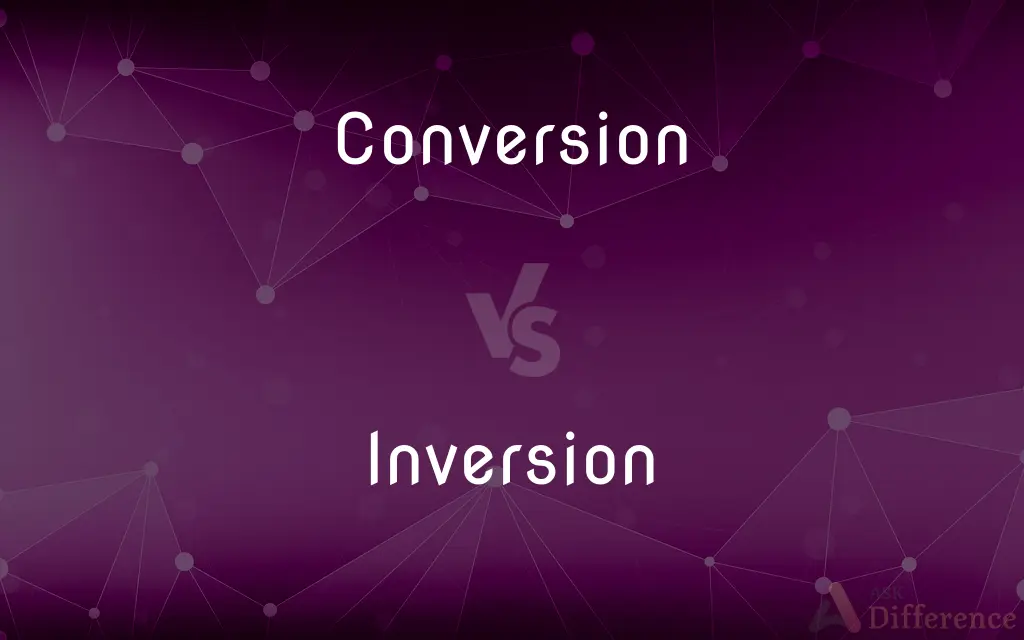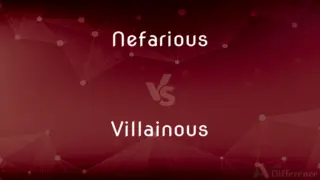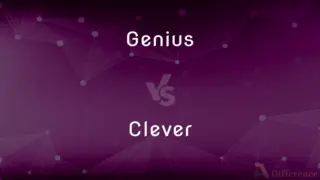Conversion vs. Inversion — What's the Difference?
By Tayyaba Rehman & Fiza Rafique — Updated on March 28, 2024
Conversion involves changing a word's class without altering its form, while inversion rearranges a sentence's word order, often for emphasis or questions.

Difference Between Conversion and Inversion
Table of Contents
ADVERTISEMENT
Key Differences
Conversion, also known as zero derivation, allows a word to change its grammatical category without altering its form. Inversion, on the other hand, involves changing the conventional order of words in a sentence, primarily for emphasis or to form questions.
Conversion operates at the level of individual words, allowing them to transition between grammatical categories, such as from a noun to a verb, without morphological change. In contrast, inversion affects the syntax of entire sentences, altering the standard word order to achieve different rhetorical or stylistic effects.
While conversion allows for flexibility and creativity at the word level, enabling a dynamic and evolving vocabulary, inversion provides structural variety, enhancing the expressive power and rhetorical flexibility of the language. Both mechanisms contribute to the richness and adaptability of English, but they operate in distinct domains—word formation versus sentence structure.
Comparison Chart
Definition
Changing a word's class without altering its form.
Reordering words in a sentence, typically for emphasis or questions.
Level of Change
Lexical (word level)
Syntactic (sentence structure)
ADVERTISEMENT
Purpose
To expand the flexibility and use of words.
To emphasize certain parts of a sentence or to form questions.
Examples
"Run" (noun) to "run" (verb).
"Seldom do I wake up early." (for emphasis)
Usage
Common in creating versatile word usage.
Used for rhetorical effect, questions, or formal writing.
Compare with Definitions
Conversion
Noun to verb.
The referee will signal the start.
Inversion
Statement to question.
Is the book on the table?
Conversion
Verb to noun.
Her constant talk annoys me.
Inversion
Place before subject and verb.
In the garden grows a tall tree.
Conversion
Verb to adjective.
The running water is cold.
Inversion
Emphasis on negative adverbs.
Never have I ever lied to you.
Conversion
Adjective to noun.
The rich should help the poor.
Inversion
Time expressions for emphasis.
Little did he know about the surprise.
Conversion
Noun to adjective.
The silk road was a major trade route.
Inversion
Conditional clauses without 'if'.
Were I a bird, I would fly away.
Conversion
The process of changing or causing something to change from one form to another
The conversion of food into body tissues
Inversion
The action of inverting something or the state of being inverted
The inversion of the normal domestic arrangement
An inversion of traditional customer–supplier relationships
Conversion
The fact of changing one's religion or beliefs or the action of persuading someone else to change theirs
His passion for seventeenth-century literature had led the former atheist to a sudden conversion
He insists that real conversion is a matter of the heart
Inversion
A reversal of the normal decrease of air temperature with altitude, or of water temperature with depth.
Conversion
A successful kick at goal after a try, scoring two points
Gavin Hastings landed one penalty and one conversion
Inversion
The process of finding a quantity, function, etc. from a given one such that the product of the two under a particular operation is the identity.
Conversion
(in the context of online marketing) the proportion of people viewing an advertisement and going on to buy the product, click on a link, etc.
You'll see better conversion rates for your local advertising if you include your physical address on your website
Keeping things simple will improve conversion
Inversion
The action or practice of relocating a multinational company's legal residence to a jurisdiction where taxes are levied at a lower rate
Since the company maintains a franchisee model, it is a viable target for inversion
Administration officials admit that their new effort to deter corporate inversions won't actually stop the practice
Conversion
The action of wrongfully dealing with goods in a manner inconsistent with the owner's rights
He was found guilty of the fraudulent conversion of clients' monies
Inversion
The act of inverting.
Conversion
The manifestation of a mental disturbance as a physical disorder or disease
Conversion disorders
Inversion
The state of being inverted.
Conversion
The act of converting.
Inversion
An interchange of position of adjacent objects in a sequence, especially a change in normal word order, such as the placement of a verb before its subject.
Conversion
The state of being converted.
Inversion
A rearrangement of tones in which the upper and lower voices of a melody are transposed, as in counterpoint.
Conversion
A change in which one adopts a new religion, faith, or belief.
Inversion
A rearrangement of tones in which each interval in a single melody is applied in the opposite direction.
Conversion
Something that is changed from one use, function, or purpose to another.
Inversion
An arrangement of the tones of a chord such that the root is not the lowest pitch, as in the rearrangement of the C-major triad CEG to EGC.
Conversion
(Law) The unlawful appropriation of another's property.
Inversion
(Chemistry) Conversion of a substance in which the direction of optical rotation is reversed, from the dextrorotatory to the levorotatory or from the levorotatory to the dextrorotatory form.
Conversion
The exchange of one type of security or currency for another.
Inversion
(Meteorology) An atmospheric condition in which the air temperature rises with increasing altitude, holding surface air down and preventing dispersion of pollutants.
Conversion
(Logic) The interchange of the subject and predicate of a proposition.
Inversion
(Genetics) A chromosomal rearrangement in which a segment of the chromosome breaks off and reattaches in the reverse direction.
Conversion
(Football) An extra point or points scored after a touchdown, as by kicking the ball through the uprights or by advancing the ball into the end zone from the two-yard line or a similar short distance.
Inversion
The action of inverting.
Conversion
(Psychiatry) The development of physical symptoms, such as paralysis or sensory deficits, as a response to stress, conflict, or trauma.
Inversion
The act of being in an inverted state; being upside down, inside out, or in a reverse sequence.
Conversion
The expression of a quantity in alternative units, as of length or weight.
Inversion
(music) The reversal of an interval; the move of one pitch in an interval up or down an octave.
Conversion
The act of converting something or someone.
His conversion to Christianity
The conversion of the database from ASCII to Unicode
Inversion
(music) The position of a chord which has a note other than the root as its bass note.
Conversion
(computing) A software product converted from one platform to another.
Inversion
(music) The flipping of a melody or contrapuntal line so that high notes become low and vice versa; the reversal of a pitch contour.
Conversion
(chemistry) A chemical reaction wherein a substrate is transformed into a product.
Inversion
(genetics) A segment of DNA in the context of a chromosome that is reversed in orientation relative to a reference karyotype or genome.
Conversion
(rugby) A free kick, after scoring a try, worth two points.
Inversion
(meteorology) A situation where air temperature increases with altitude (the ground being colder than the surrounding air).
Temperature inversion
Conversion
(American football) An extra point (or two) scored by kicking a field goal or carrying the ball into the end zone after scoring a touchdown.
Inversion
A section of a roller coaster where passengers are temporarily turned upside down.
Conversion
(marketing) An online advertising performance metric representing a visitor performing whatever the intended result of an ad is defined to be.
Inversion
(grammar) deviation from standard word order by putting the predicate before the subject. It takes place in questions with auxiliary verbs and in normal, affirmative clauses beginning with a negative particle, for the purpose of emphasis.
Conversion
(law) Under the common law, the tort of the taking of someone's personal property with intent to permanently deprive them of it, or damaging property to the extent that the owner is deprived of the utility of that property, thus making the tortfeasor liable for the entire value of the property.
The conversion of a horse
Inversion
(algebra) An operation on a group, analogous to negation.
Conversion
(linguistics) The process whereby a new word is created without changing the form, often by allowing the word to function as a new part of speech.
Inversion
, particularly in early psychoanalysis.
Conversion
(obsolete) The act of turning round; revolution; rotation.
Inversion
The act of inverting, or turning over or backward, or the state of being inverted.
Conversion
(logic) The act of interchanging the terms of a proposition, as by putting the subject in the place of the predicate, or vice versa.
Inversion
A change by inverted order; a reversed position or arrangement of things; transposition.
It is just the inversion of an act of Parliament; your lordship first signed it, and then it was passed among the Lords and Commons.
Conversion
(math) A change or reduction of the form or value of a proposition.
The conversion of equations; the conversion of proportions
Inversion
A movement in tactics by which the order of companies in line is inverted, the right being on the left, the left on the right, and so on.
Conversion
Changing a miniature figure into another character, usually by mixing different parts, or molding the model's parts, or doing both.
Inversion
A change in the order of the terms of a proportion, so that the second takes the place of the first, and the fourth of the third.
Conversion
The act of turning or changing from one state or condition to another, or the state of being changed; transmutation; change.
Artificial conversion of water into ice.
The conversion of the aliment into fat.
Inversion
A peculiar method of transformation, in which a figure is replaced by its inverse figure. Propositions that are true for the original figure thus furnish new propositions that are true in the inverse figure. See Inverse figures, under Inverse.
Conversion
The act of changing one's views or course, as in passing from one side, party, or from of religion to another; also, the state of being so changed.
Inversion
A change of the usual order of words or phrases; as, "of all vices, impurity is one of the most detestable," instead of, "impurity is one of the most detestable of all vices."
Conversion
An appropriation of, and dealing with the property of another as if it were one's own, without right; as, the conversion of a horse.
Or bring my action of conversionAnd trover for my goods.
Inversion
A method of reasoning in which the orator shows that arguments advanced by his adversary in opposition to him are really favorable to his cause.
Conversion
The act of interchanging the terms of a proposition, as by putting the subject in the place of the predicate, or the contrary.
Inversion
Said of intervals, when the lower tone is placed an octave higher, so that fifths become fourths, thirds sixths, etc.
Conversion
A change or reduction of the form or value of a proposition; as, the conversion of equations; the conversion of proportions.
Inversion
The folding back of strata upon themselves, as by upheaval, in such a manner that the order of succession appears to be reversed.
Conversion
A change of front, as a body of troops attacked in the flank.
Inversion
The act or process by which cane sugar (sucrose), under the action of heat and acids or enzymes (as diastase), is broken or split up into grape sugar (dextrose), and fruit sugar (levulose); also, less properly, the process by which starch is converted into grape sugar (dextrose).
Conversion
A spiritual and moral change attending a change of belief with conviction; a change of heart; a change from the service of the world to the service of God; a change of the ruling disposition of the soul, involving a transformation of the outward life.
He oftFrequented their assemblies, . . . and to them preachedConversion and repentance, as to soulsIn prison under judgments imminent.
Inversion
A reversal of the usual temperature gradient of the atmosphere, in which the temperature increases with increased altitude, rather than falling. Called also temperature inversion.
Conversion
An event that results in a transformation
Inversion
The conversion of direct current into alternating current; the inverse of rectification. See inverted rectifier.
Conversion
A change in the units or form of an expression:
Conversion from Fahrenheit to Centigrade
Inversion
A portion of the genome in which the DNA has been turned around, and runs in a direction opposite to its normal direction, and consequently the genes are present in the reverse of their usual order.
Conversion
A successful free throw or try for point after a touchdown
Inversion
The layer of air near the earth is cooler than an overlying layer
Conversion
A spiritual enlightenment causing a person to lead a new life
Inversion
Abnormal condition in which an organ is turned inward or inside out (as when the upper part of the uterus is pulled into the cervical canal after childbirth)
Conversion
(psychiatry) a defense mechanism represses emotional conflicts which are then converted into physical symptoms that have no organic basis
Inversion
A chemical process in which the direction of optical rotation of a substance is reversed from dextrorotatory to levorotary or vice versa
Conversion
A change of religion;
His conversion to the Catholic faith
Inversion
(genetics) a kind of mutation in which the order of the genes in a section of a chromosome is reversed
Conversion
Interchange of subject and predicate of a proposition
Inversion
The reversal of the normal order of words
Conversion
Act of exchanging one type of money or security for another
Inversion
(counterpoint) a variation of a melody or part in which ll ascending intervals are replaced by descending intervals and vice versa
Conversion
The act of changing from one use or function or purpose to another
Inversion
Turning upside down; setting on end
Inversion
The act of turning inside out
Common Curiosities
Can conversion happen between any word classes?
Yes, conversion can occur between various word classes, such as noun to verb, verb to adjective, and so on.
What is conversion in grammar?
Conversion is a linguistic process where a word changes its grammatical category without altering its form.
What is inversion in English?
Inversion involves reversing the conventional order of words in a sentence, often for questions or emphasis.
What is a common example of conversion from everyday language?
Turning the noun "email" into the verb "to email" is a common example.
Is inversion common in everyday speech?
While inversion is less common in casual speech, it frequently appears in questions and some fixed expressions.
How does conversion contribute to language evolution?
Conversion facilitates linguistic adaptability, allowing new words and uses to emerge naturally.
How does conversion affect word usage?
Conversion expands the functionality and usage of words, allowing for creative and versatile language use.
Do all languages use conversion and inversion?
While many languages employ these processes, the specifics and prevalence can vary widely.
Why do writers use inversion?
Writers use inversion to emphasize certain elements of a sentence or to create a particular rhythm or mood.
Can inversion be used in formal writing?
Yes, inversion can add stylistic variety and emphasis in formal writing.
What are examples of inversion for emphasis?
Examples include "Seldom have I seen such courage" or "Only then did he understand."
Are there rules governing the use of inversion?
While there are guidelines, especially for question formation, inversion often follows stylistic rather than strict grammatical rules.
In what contexts is inversion particularly effective?
Inversion shines in literary, formal, and poetic contexts, where emphasis or stylistic variation is desired.
Can conversion create ambiguity in language?
Occasionally, conversion might lead to ambiguity, but context usually clarifies meaning.
How does inversion affect the readability of a sentence?
Inversion can either enhance readability by adding emphasis and variety or, if overused, potentially confuse readers by deviating from expected word order.
Share Your Discovery

Previous Comparison
Nefarious vs. Villainous
Next Comparison
Genius vs. CleverAuthor Spotlight
Written by
Tayyaba RehmanTayyaba Rehman is a distinguished writer, currently serving as a primary contributor to askdifference.com. As a researcher in semantics and etymology, Tayyaba's passion for the complexity of languages and their distinctions has found a perfect home on the platform. Tayyaba delves into the intricacies of language, distinguishing between commonly confused words and phrases, thereby providing clarity for readers worldwide.
Co-written by
Fiza RafiqueFiza Rafique is a skilled content writer at AskDifference.com, where she meticulously refines and enhances written pieces. Drawing from her vast editorial expertise, Fiza ensures clarity, accuracy, and precision in every article. Passionate about language, she continually seeks to elevate the quality of content for readers worldwide.
















































